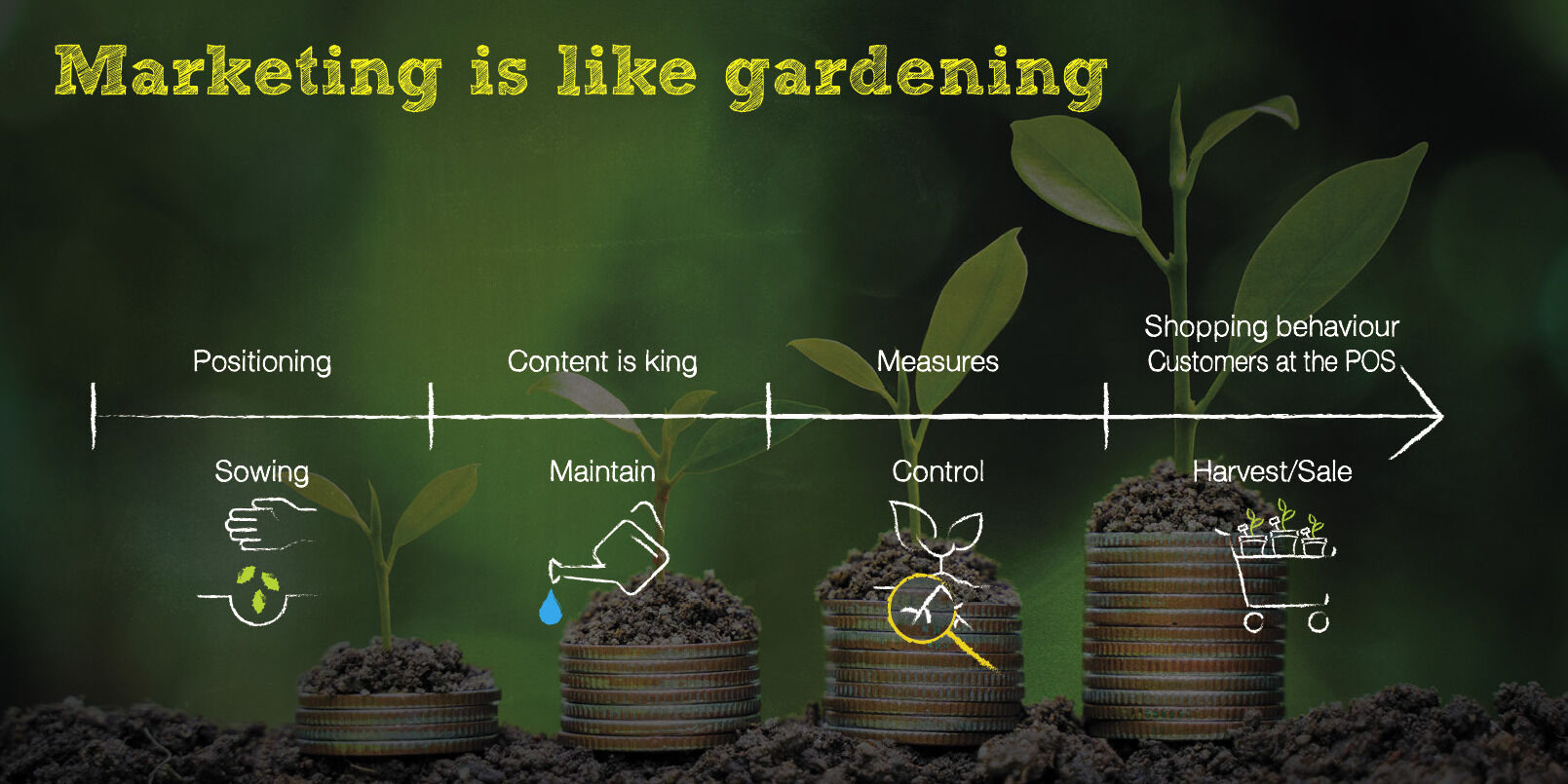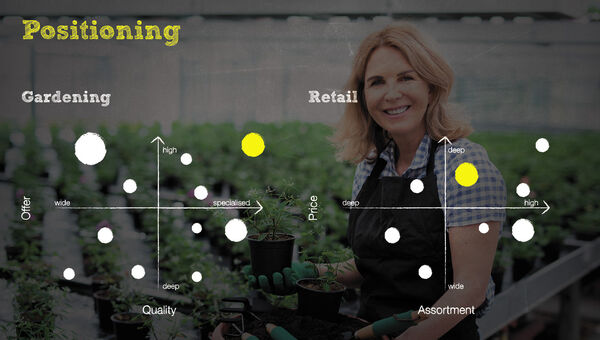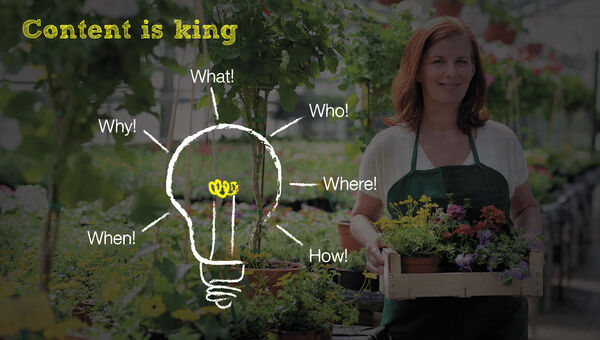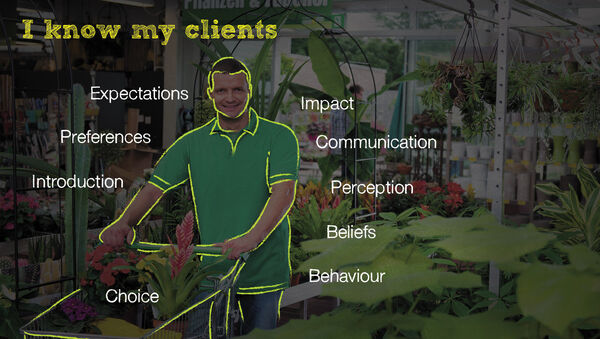Many companies, especially smaller ones, have a hard time with marketing, which is often dismissed as an unnecessary cost factor or a necessary evil. But good and successful marketing is actually like gardening. You have to sow, then care for it properly, and in the end you can reap. Potential customers themselves are like plants that need to be nurtured and cared for.
Add to that today's expectations: You invest (or sow) a certain amount and get back x times that amount in a short time. Experienced gardeners know that this is not the case, but that patience and work are necessary for a sustainable yield. It is the same in marketing: many measures only pay off in the medium to long term. Moreover, it is often almost impossible to measure exactly which measures contribute to which success.
Positioning your own company
Just as there are different plants, the needs of customers are also very different. It is impossible to meet all needs. Therefore the own positioning is very important. Positioning is about creating and highlighting strengths and qualities in a targeted manner that distinguish a product or service from others. With positioning, you develop your unique selling proposition (see box "Positioning"). In short, positioning expresses what your product does for whom and why. So it's about these three key questions:
- What do I offer?
- Who is my target group?
- Why does a customer need to have my product/service?
Markus* has never even asked himself the question of positioning. Since he started, the business has simply always grown and demand has increased. Although he is annoyed by the price erosion on many of his services, he has always been able to make up for that with increased efficiency. The only thing that bothers him is that he is getting fewer and fewer high-end remodels and more and more maintenance work instead, because he is often very cheap. A good workload is a very good starting point for thinking about positioning and anchoring his business where his own strengths lie and where he is profitable.
Martina* has just started thinking intensively about her positioning. For her, it's clear that she wants to focus primarily on in-house and regional production, and in a medium price segment, since many of her potential customers are willing to pay a little more for good, local products. She wants to emphasize this in her marketing mix in the future.
Price is the most frequently mentioned argument when entrepreneurs are asked why they think a potential customer has chosen the competitor. It's true, price has become an important criterion in the purchasing decision. But by no means is the (lowest) price the important criterion for all customers. The price-performance ratio is also frequently mentioned. That is, the price is put in relation to a service. If the service is perceived as high, the absolute price can also be higher. That's where it's important for a specialty store to start and to highlight its own services. Because the specialized trade cannot win the pure price war. In fact, there are countless other parameters that can influence a purchase decision (see box "Purchase decision").
Successful marketing requires that the measures reach the intended target groups and that customers understand what services and values the company stands for. This is best achieved with meaningful content.
Content is King
Before thinking about the appropriate advertising media, the message you want to convey must be clearly defined. The more interesting and specific this message is for the target clientele, the better. It is crucial that the message is understood, arouses interest in the addressee and moves him to action. This is most easily achieved if the information meets a need of the target customer or even offers a solution to a problem.
It is often difficult, especially for smaller companies, to formulate messages correctly. Owners and employees deal with the matter on a daily basis. For them, technical messages are clear and logical. Lay people usually have a completely different view of a technical topic. This fact must be taken into account. Ask people close to you how they perceive your company.
Think of the young homeowner, for example. He probably hasn't given much thought to his garden yet. A lot of things are new. If he has a problem in his garden, he will probably not look for a solution with the right technical terms, but as he feels the problem. Pick up your potential customers accordingly. You are the problem solver, so explain briefly and concisely what "problem solutions" you offer.
A key element for this is the website. Think of your website as the reception desk of a hotel. It is available 365 days a year around the clock and the better information it can provide, the more comfortable the guest feels. The difference is that the website cannot directly address the potential customer's concerns (unless a live chat version is implemented). It is therefore all the more important that the website offers as much information as possible, that the potential customer feels comfortable on the website and that the content is up-to-date.
The visual appearance of the content is not insignificant. The basic rule for website content is: less is more. So it's better to have fewer tips with a lot of content, fewer pictures, but select them meaningfully and edit them well. In certain situations, stock images can also serve as symbols. Some examples of content are compiled in the box "Web content".
Shopping behavior
Martina has long had the feeling that more and more customers are shopping online and only go to her for advice, especially in the area of hard goods. Many retailers have this feeling. In fact, online retailing has increased significantly in recent years. And yet, current studies show that over 85 percent of goods are still bought in stationary retail and only 15 percent online. But over 80 percent of customers inform themselves online before buying. This means that the information online must be so interesting that customers are persuaded to come into the shop or make contact.
The hybrid customer is reality today: sometimes he buys online, sometimes stationary, sometimes he informs himself online and sometimes he spontaneously buys something offline that he just likes. This trend is likely to intensify in the future and a business must take this into account. Products that are easy to compare and are offered much cheaper online have become difficult for the stationary trade.
It is impossible to keep up, because the big online retailers are trimmed for efficiency and can usually offer a lower price. In contrast, bricks-and-mortar retail has a big advantage: the customer can experience, smell, compare, etc. the goods. In addition, the specialist retailer has the opportunity to build up a personal relationship with the customer. Very important: If the customer is already there, then the goal must be to enter into a conversation with him, to serve him optimally (keyword: additional sales) and to conclude a sale.
One advantage of the green sector is that plants are difficult to standardise and ship. Nevertheless, there are already some successful online shops for plants. Here you have to ask yourself whether they really address the same clientele. Markus has it a little easier there. Most of his customers are not yet in a position to buy a garden online. Nevertheless, online shops also have an influence on his customers. For example, it is now relatively easy to find out the prices for pots, hedge plants and accessories and to push for lower prices accordingly. This makes it all the more important for Markus to be able to sell his experience and knowledge. He succeeds best when he can sell the customer a solution to his "problem" without already going into the details.
Why advertise at all?
Often, especially in smaller businesses and especially in the green sector, one hears the sentence: "I don't need marketing, the customers will come anyway". This may be partly true, but especially the last few years have shown that customer behaviour can change very quickly. If a business is not already known in such situations, it will be cut off from the market. If a business cannot be found online nowadays, it simply does not exist in the customers' minds. It's like it used to be when you weren't in the phone book.
It should not be forgotten that society as a whole has become more mobile and dynamic. On the one hand, this means that customers are travelling further and further distances to shop and, on the other hand, that up to 10 percent of the population moves every year. In extreme cases, the business can lose 10 per cent of its clientele every year as a result. And how are the newcomers supposed to know that your business exists if you don't do any marketing?
By the way, a good online presence can also help you find suitable staff. As in so many areas of life, first impressions count here too. Good employees like to work for companies they can identify with. If it is clear on the website what the values and services of the company are, the chance that exactly the right employees will contact you increases.
*Markus has a thriving horticultural business with 20 employees. He works mainly in the private sector, doing mainly high-end alterations and maintenance work. The order books are usually full months in advance. Therefore, Markus asks himself, why should he spend money on marketing when it is going on anyway?
*Martina runs a small retail business in a good location with her own plant production, mainly seasonal plants, herbs and vegetables. She has long been able to count on a loyal clientele, but is slowly noticing that the clientele is getting older and is tending to decline. Martina asks herself how she can attract more customers with her small marketing budget.






